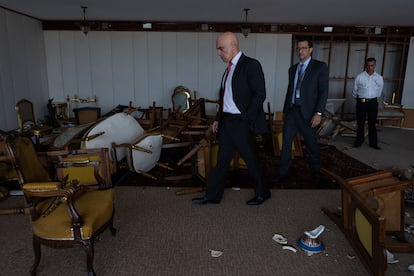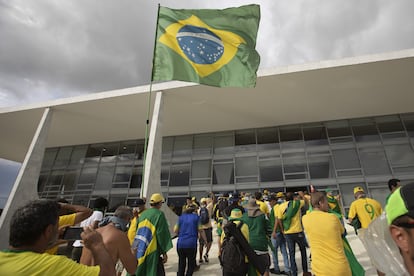Brazil holds opening trial of Bolsonaro supporters who attempted a coup against Lula
The prosecution, which is seeking 30 years for the first four defendants, plans to set exemplary sentences to prevent further attacks on democracy


On January 8, 2023, in scenes reminiscent of the storming of the U.S. Capitol two years earlier, Brazil’s Supreme Court was invaded by a violent mob of supporters of outgoing president Jair Bolsonaro. Waving the national flag, the protestors also took over Congress and the presidential Palácio do Planalto in Brasília, in the most serious attack against Brazilian democracy since the military dictatorship (1964-1985). On Wednesday, the Supreme Court convened to hold the first trial against the coup plotters. Proceedings started with four defendants arrested in flagrante delicto on January 8, part of the Bolsonarista shock troops on that day. The prosecution accuses them of an attempted coup d’état against the leftist President Luiz Inácio Lula da Silva, who had been in power for a week at the time. “They attempted to depose a legitimately elected government under the pretext of electoral fraud,” said Deputy Attorney General Carlos Frederico Santos, in his opening statement. The four defendants face sentences totaling up to 30 years in prison and fines for moral damages of 100 million reais ($20 million) if found guilty.
Around 1,300 people have been charged in the Supreme Court macro-case, which is advancing at breakneck speed. In a country where the rights of the accused enjoy considerable protection, almost 130 people have already been imprisoned for eight months for the January 8 assault.
The Prosecutor’s Office and the investigating judge in the case, Alexandre de Moraes, have made it clear that they intend to impose exemplary sentences on the most violent protestors among the mob with a view to dissuading any further attacks on Brazilian democracy. “We want to show the world that Brazil is no longer a banana republic, that it is a state that takes the rule of law seriously, that coups d’état are a closed page in our history,” said Santos, who added that “fake news is still circulating and we have to clarify [what happened] once and for all.”
The defendants in this first trial — an IT civil servant, a forestry engineer, and two deliverymen — were not in the courtroom Wednesday. They are aged between 24 and 52 and come from cities in the states of São Paulo and Paraná. The crimes they are charged with, like hundreds more of the defendants, are violent abolition of the rule of law, coup d’état, armed criminal association and damage to property. Three of the defendants followed the trial by videoconference from prison; the fourth, who was bailed, asked to be present in court, but the request was denied.
Former president Bolsonaro, who was in the U.S. on January 8, is also being investigated as an alleged instigator. The attacks were the culmination of a systematic campaign by Bolsonarismo to delegitimize the institutions, question the electoral process and sow doubts about Lula’s victory at the ballots.
During the trial, videos were shown that the first defendant, 51-year-old Aécio Lucio Costa Pereira, recorded that day, wearing a T-shirt with the slogan “federal military intervention” and announcing that he would defecate in Congress. He had arrived in Brasília from São Paulo with a group of so-called patriots. Other images of the assault were presented, including some recorded in the same courtroom on January 7, when a crowd of Bolsonaristas rampaged through the Supreme Court, which suffered significant material damage.
The opening session was marked by the dialectic exchanges between Judge Moraes and Pereira’s defense lawyer, who stated that the proceedings are “a political trial” and described the court as “illegitimate.” Additionally, perfectly aware that the hearing is being broadcast live on television, he stressed that his client has been imprisoned for eight months without being able to see his wife and children because prison rules require a Covid-19 vaccination certificate and they have chosen not to receive the shot. “I consider it psychological torture,” the lawyer said.

“A multitudinous crime”
Moraes resorted to irony to counter the defense’s claim that Pereira was peacefully defending his freedom. “We are talking about coup plotters,” the judge said. “Because in that denialist narrative, it seems that on January 8 we had a Sunday in the park with a crowd that suddenly said: ‘Let’s do a bit of invading!’” Famous for the superpowers he has been granted in the name of defending democracy and for his sheriff-like methods, Moraes is intent on neutralizing the risk of Brazilian democracy coming under further attack.
As the deliberations of the Supreme Court are public, the votes of the first two magistrates made it clear that there is no unanimity in the court over the severity of the sentence. Moraes has asked for 17 years for the first defendant, while one of his colleagues sought only 2.5 years for damage to patrimony while absolving him of the coup charges. The session will continue Thursday with the remaining votes to be cast.
The trials have begun with those accused of carrying out the coup attempt on the ground: ordinary citizens, intoxicated by an overdose of falsehoods, many of which were churned out by the ultra-right Bolsonaro. Later in the macro-trial, the idea is that those who contributed to the uprising without getting their hands dirty will also sit in the dock: the masterminds, the financiers, and the authorities who neglected their duties. Recently, the entire leadership of the Brasília military police was arrested and imprisoned. Anderson Torres, who was Bolsonaro’s Minister of Justice, remains on probation.
After Lula’s victory was made official on October 30, thousands of Bolsonaro supporters camped outside barracks all over Brazil, demanding the military intervene to prevent a third term for the leftist politician.
During the tense months of the electoral campaign and the failed coup, Morares was handed enormous powers to tie up the most extreme wing of Bolsonaro supporters in the name of the defense of democracy. His trajectory is reminiscent to that of Judge Sergio Moro, who oversaw the vast Lava Jato corruption case. Moro was considered the savior of Brazil before falling from grace. He now occupies a seat in the Senate.
Moraes and the prosecution have tried to rebut the defense, which argues that the charges do not individualize what exactly each of the hundreds of people involved did on January 8. “It was a multitudinous crime. The important thing is not who broke a window, a door, or a work of art, but the result of those multitudinous acts,” said Santos.
Sign up for our weekly newsletter to get more English-language news coverage from EL PAÍS USA Edition
Tu suscripción se está usando en otro dispositivo
¿Quieres añadir otro usuario a tu suscripción?
Si continúas leyendo en este dispositivo, no se podrá leer en el otro.
FlechaTu suscripción se está usando en otro dispositivo y solo puedes acceder a EL PAÍS desde un dispositivo a la vez.
Si quieres compartir tu cuenta, cambia tu suscripción a la modalidad Premium, así podrás añadir otro usuario. Cada uno accederá con su propia cuenta de email, lo que os permitirá personalizar vuestra experiencia en EL PAÍS.
¿Tienes una suscripción de empresa? Accede aquí para contratar más cuentas.
En el caso de no saber quién está usando tu cuenta, te recomendamos cambiar tu contraseña aquí.
Si decides continuar compartiendo tu cuenta, este mensaje se mostrará en tu dispositivo y en el de la otra persona que está usando tu cuenta de forma indefinida, afectando a tu experiencia de lectura. Puedes consultar aquí los términos y condiciones de la suscripción digital.








































